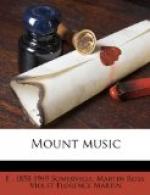It must, with regret, be stated, that the relatives and friends in far-away Ireland, instead of admiring “poor Tom’s” fidelity to his wife’s wishes, murmured together that it was very unfortunate that “poor Theresa” had not died when Larry was born, as, in that case, this “disastrous change of religion” would not have taken place. Taking into consideration the fact that Larry was to live among his Irish cousins, it is possible that from the point of view of expediency, the relations and friends were in some degree justified.
Ireland, it is almost superfluous to observe, has long since decided to call herself The Island of Saints, an assertion akin to the national challenge of trailing the coat-tails, and believers in hereditary might, perhaps, be justified in assuming a strictly celibate sainthood. Be that as it may, Irish people have ever been prone to extremes, and, in spite of the proverb, there are some extremes that never touch, and chief among them are those that concern religion. Religion, or rather, difference of religion, is a factor in every-day Irish life of infinitely more potency than it is, perhaps, in any other Christian country. The profundity of disagreement is such that in most books treating of Ireland, that are not deliberately sectarian, a system of water-tight compartments in such matters is carefully established. It is, no doubt, possible to write of human beings who live in Ireland, without mentioning their religious views, but to do so means a drastic censoring of an integral feature of nearly all mundane affairs. This it is to live in the Island of Saints.
In this humble account of the late Plesiosauridae and their contemporaries, it is improbable that any saint of any sect will be introduced; one assurance, at least, may be offered without reservation. Those differing Paths, that alike have led many wayfarers to the rest that is promised to the saints, will be treated with an equal reverence and respect. But no rash undertakings can be given as touching the wayfarers, or even their leaders, who may chance to wander through these pages. Neither is any personal responsibility accepted for the views that any of them may express. One does not blame the gramophone if the song is flat, or if the reciter drops his h’s.
After this exhaustive exordium it is tranquillising to return to the comparative simplicities of the existence of the young Talbot-Lowrys. Those summer holidays of the year 1894 were made ever memorable for them by the re-inhabiting of Coppinger’s Court. Mount Music was a lonely place; it lay on the river, about midway between the towns of Cluhir and Riverstown, either of which meant a five or six mile drive, and to meet such friends and acquaintances as the neighbourhood afforded, was, in winter, a matter confined to the hunting-field, and in summer was restricted, practically, to the incidence of lawn-tennis parties. Possibly the children of Mount Music, thus thrown upon their own resources, developed a habit of amusing themselves that was as advantageous to their caretakers as to their characters. It certainly enhanced very considerably their interest in the advent of Master St. Lawrence Coppinger. He became the subject of frequent and often heated discussions, the opinion most generally held, and stated with a fine simplicity, being that he would prove to be “a rotter.”




